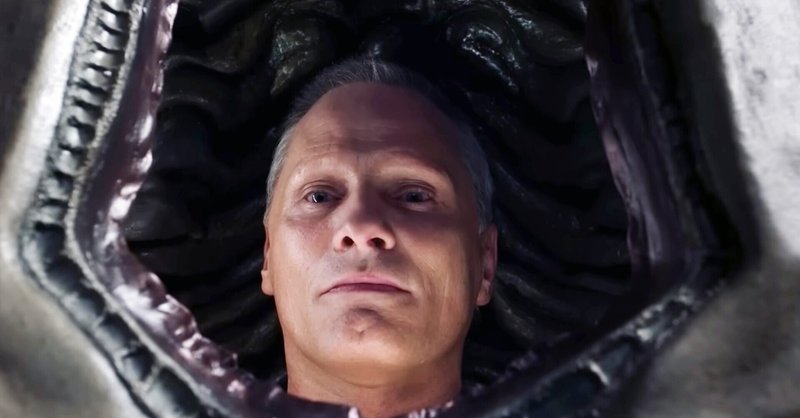
David Cronenberg’s “Crimes of the Future (2022)”
The realization of philosophical metaphors into actuality evokes intriguing prospects. Cronenberg's latest endeavor, "Crimes of the Future," is replete with such scenes. While "eXistenZ" (1999) cushioned conceptual representations within virtual spaces, the current narrative transcends these confines. From inception to conclusion, Cronenberg manifests fantasies within the recesses of his mind—a spectacle that would astound even the denizens of Yapoo. Resonating closest with the cinematic style of German Expressionism, albeit with an unparalleled intricacy in the incorporation of metaphorical constructs, the film navigates a world devoid of tangible existence, akin to a futuristic science fiction saga, yet evoking recollections of moral and axiological inversions akin to those crafted by Jean Genet or the Marquis de Sade. While various biomechanical devices of speculative imagination adorn sensual scenes, the most evocative moments lie within the recurring instances of intimacy. Notably, a remark by the protagonist, Vigo Montesen, to the seductive agent of government agencies, played by Kristen Stewart, "I'm not accustomed to old sex," begs the question: what constitutes new sex? It is therein, amidst ensuing pain and mechanical intervention... This narrative arc evokes reminiscences of the denouement of "Videodrome" (1982), wherein the protagonist's acquisition of a novel corporeal form is intimated (though never explicitly visualized by the audience). As suggested by its title, the film adheres to the genre conventions of crime noir. The overarching motif, revolving around a father's desire for the resurrection of his slain offspring, serves as a pervasive MacGuffin throughout. One could also interpret the interplay between the protagonists' artist group, the Organ Registry, and the Evolutionary Revolutionary Army as a political fiction rife with contention. Undoubtedly, this opus befits the epithet of "Dream Noir."
映画批評・クローネンバーグの「未来の犯罪(2022)」
哲学の隠喩[1]が現実化したらどうなるか。クローネンバーグの新作、「未来の犯罪」[2]はそういうシーンのてんこ盛りである。
二十年前の「イグジステンズ」(eXistenZ, 1999)はバーチュアルな空間というクッションがおかれていたから、観念の表象はあくまでも虚空間内での二次創作であったが、今回はその上を行く。
最初から最後までクローネンバーグの脳内で起こるファンタジーの具現化[3]。家畜人ヤプーもびっくりである。
一番近いスタイルの映画はドイツ表現主義ではないか[4]。ただし、隠喩であるはずの空想の医療機械等のつくりこみが、ハンパない。
現実には存在しないものしかない世界で進むドラマという意味では超未来のSFだといえばそうだが、ジャン・ジュネやサド侯爵の作り出したモラルや価値観が転倒した世界をも想起される。
色々なバイオメカニカルな想像上の医療機器を駆使した官能的なシーンが出てくるが、それよりも官能的なのは、二度出てくる接吻のシーンである。
そのうちのひとつ、誘惑してくる政府組織の女(トワイライトのクリステン・スチュワート)に対して主人公のヴィゴ・モンテーセンのいう一言、「古いセックスには慣れてなくてね」新しいセックスとは何か。それはそのあと出てくる痛みと、機械を介した…。
この辺はヴィデオドローム(1982)の終盤、新たな肉体を手に入れた主人公を彷彿とさせる(ヴィデオドロームにおいて、観客はその新しい肉体を眼にすることはないのではあるが)。
題名にも示されるように、この作品は犯罪映画というジャンルを踏襲している。母の子殺しとその子の復活を願う父の存在が全体を通したマクガフィン[5]といってもよい。
主人公たちのアーチスト・グループ、Organ Registry(政府の臓器捜査員)、そして進化の革命軍、この三つがつばぜりあいをする政治フィクションとして観ることもできる。
Dream Noirという言葉が似合う力作であることに間違いない。
[1]たとえばドゥルーズの「器官なき身体(corps sans organes)」「欲望する機械」「n個の性」「脱領土化」
[2]「クライム・オブ・ザ・フューチャー/未来犯罪の確立」が、1970年代版、Crimes of The Futureの邦訳である。話は全く関係ない。2022年版の邦題が気になる。
[3]端的にいえば、出てくる人物、機械、装置、建物、状況の全てが象徴であるということ。ボードリヤール的にいえばオリジナルなきコピーまたはシミュラクラ。ソシュール的にいえば、シニフィアンとシニフィエ。
[4] (ドイツ表現主義は)客観的表現を排して内面の主観的な表現に主眼をおくことを特徴とした。(Wikipedia)
[5] マクガフィン (英: MacGuffin, McGuffin) とは、小説や映画などのフィクション作品におけるプロット・デバイスの一つであり、登場人物への動機付けや話を進めるために用いられる作劇上の概念のこと。(Wikipedia)
この記事が気に入ったらサポートをしてみませんか?
